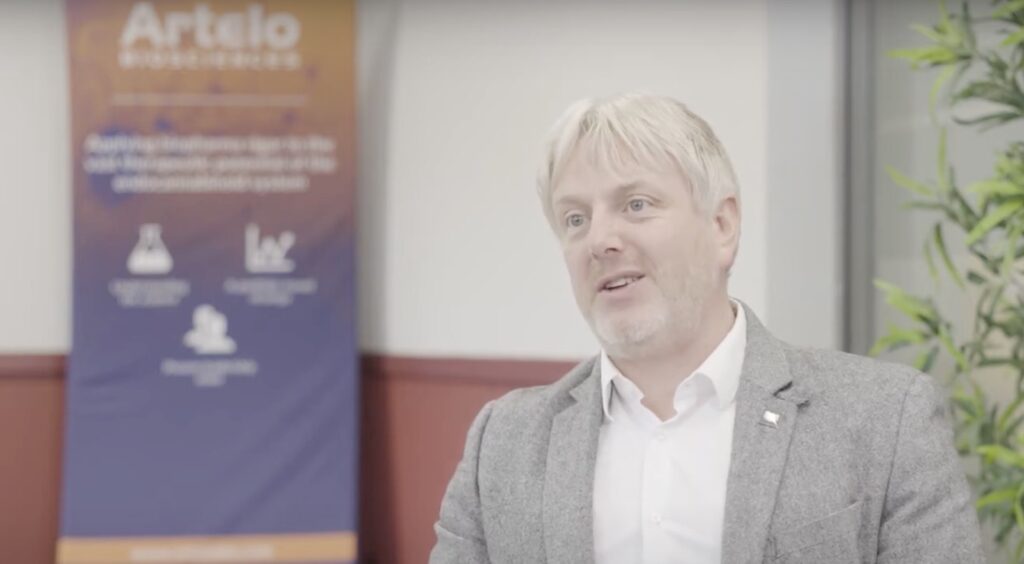
Dr Andy Yates, Chief Scientific Officer at Artelo Biosciences
“Right from the off, I didn’t see the cannabis plant as a drug of abuse, but as a source of compounds called cannabinoids that are very useful medicines,” says Dr Andy Yates, CRDG Board Member and Chief Scientific Officer at Artelo Biosciences.
The scientist’s first serious engagement with the plant happened during his pharmacy degree at Nottingham University in the late 90s. The course included a module on ‘drugs of abuse’, with topics including cannabis and THC.
Such was Yates’ interest that it became the focus of his PhD in cannabinoid medicinal chemistry at the same university, where he sought to find out how the benefits of cannabis could be harnessed in a medical context. “By the time I’d finished I was convinced that cannabinoids had a role to play in medicine,” he says.
His subsequent 12 years at AstraZeneca put this interest largely on hold. While the pharmaceutical giant worked with cannabinoids, it wasn’t a major focus (though one of the cannabinoid compounds being developed by AstraZeneca, AZD1940, eventually became the lead clinical asset in Artelo, ART27.13).
When AstraZeneca relocated its R&D centre and corporate headquarters from Manchester to Cambridge in 2016, Yates decided it was time to move on. And it wasn’t long before he spoke with Greg Gorgas, a biotech entrepreneur that would give Yates the opportunity to focus on cannabinoids once again.
At the time people were talking about the potential to create $1bn companies focused on cannabinoids by supplying the unlicensed or medicinal cannabis market primarily from botanical sources. Artelo, the company that Yates and Gorgas formed, was created to focus on fully licensed medicines that were rationally designed by scientists to modify the human body’s own mechanism for creating cannabinoids – the endocannabinoid system (ESC) – rather than the unlicensed specials or named patients that other firms were developing.
The medicines that Artelo had in mind have to satisfy more rigorous criteria around safety and efficacy, typically taking between five and eight years of clinical development, after which they can be widely prescribed. Unlicensed specials, by contrast, are only available via specialist doctors. They do not undergo clinical testing, though they have to meet Good Manufacturing Practices (GMP) and in the case of cannabinoids a CBD/THC statement must be filed.
Yates understands why some companies took the unlicensed route, which is quicker. “As a biotech startup you have to burn cash to generate the required data,” he says. “Developing medicines has a lot of risk, though at the end you should have an approved licensed drug which is a big reward for investors, doctors and patients.”
However, those who invest in drug development can generate returns earlier by attracting investors and partners through compelling new data and hitting milestones. “The data in itself gets people excited. Researchers want to work with you, pharma companies may partner and acquire your medicine, and your stock price can go up,” Yates says.
And biotech startups need not complete the drug licensing process on their own. Once data has started to demonstrate the safety and efficacy of a potential medicine, larger pharmaceutical companies frequently become interested in making an investment, either by buying the company or licensing individual medicines.
“Biotech startups often need the help of Big Pharma,” Yates says. “It’s not just the cash. It’s also their expertise, their resources to run clinical trials, and their assistance to engage with regulatory authorities around the globe.”
As it stands, Artelo is currently developing three different drugs. Its lead clinical asset, ART27.13, is aimed at treating cancer anorexia and cachexia syndrome (CACS), which is found in more than 60% of advanced stage cancer patients where patients lose weight, muscle mass, appetite and ultimately quality of life.
The drug has undergone phase 1 and 2 clinical trials, mostly in UK hospitals with some testing in Ireland and Norway and the full results are expected in 2025.
A second project, ART12.11, is described by Yates as “turbocharged CBD”. Consisting of a co-crystal combining CBD with tetramethylpyrazine (TMP). Also known as ligustrazine, TMP is a plant-derived compound with a decades-long history of use in medicine and food flavourings worldwide, as well as a good safety profile.
In the case of ART12.11 it acts as a ‘spacer molecule’ that makes CBD more soluble and easier to get into the bloodstream, making it far more effective. Currently it’s the only CBD co-crystal to have an issued composition of matter patent from the US Patent and other Trademark Offices.
“CBD is an amazing molecule. If you put it into humans and animals the pharmacology and safety profile is fantastic,” Yates says. But he notes that in it is difficult to get it into the blood, especially with commonly-used tablets and capsules. Artelo’s early pre-clinical data suggests that ART12.11 is more effective at treating anxiety and depression than other forms of CBD, as well as being pro-social and with no effect on short-term memory.
Yates is also bullish on the advantages of innovative CBD medicines over established treatments for treating anxiety. He notes that diazepam, sold under brand names like Valium, is highly addictive within two to three weeks, while SSRIs and SNRIs take between two to four weeks to start working and with negative side effects during and after treatment.
Another Artelo drug, ART26.12, aims to inhibit fatty acid binding proteins (FABPs) which regulate the ECS, among other functions. The company’s research has suggested it could be effective at treating pain, anxiety, skin conditions and cancer through mechanisms involving the ECS. While there has been no human trials of ART26.12 yet, Artelo has recently received approval from the Food and Drug Administration (FDA) to start trials later this year.